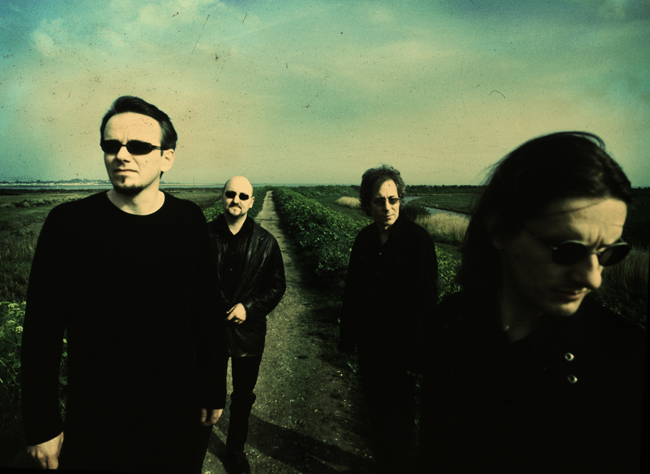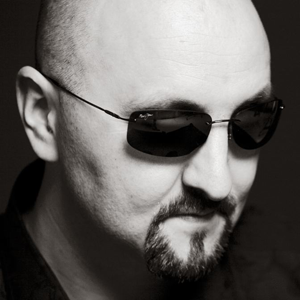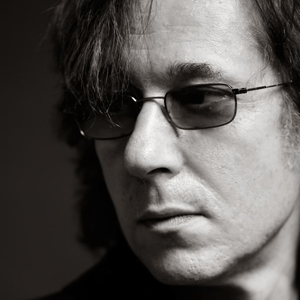
Donate to Innerviews
Since 1994, Innerviews has provided uncompromising, in-depth interviews with musicians across every genre imaginable. And it does that with no trackers, cookies, clickbait, or advertising.
Your donations are welcome to help continue its mission of highlighting incredible music and artists, without any commercial considerations.
Your contributions will be instantly transformed into stories and videos, and cover hosting and web management costs. Importantly, your dollars will help ensure Innerviews remains absolutely free to all visitors, independent of their ability to financially support it.
Please consider making a donation today by using the PayPal QR code below.

Porcupine Tree
Cinematic Catharsis
by Anil Prasad
Copyright © 2005 Anil Prasad.

It’s hard to believe it’s been 18 years since Porcupine Tree first emerged. Initially a solo home studio project for songwriter and multi-instrumentalist Steven Wilson, the moniker now represents a fierce, four-man outfit also comprising ex-Japan keyboardist Richard Barbieri, bassist Colin Edwin and drummer Gavin Harrison. The group is rapidly transcending cult status to become a significant force in alternative rock circles, garnering a devoted worldwide fan base—mainly due to the success of 2002’s In Absentia and its latest release Deadwing.
Deadwing takes the decidedly metal-tinged art rock of In Absentia and tempers it with a more cinematic and diverse approach. It strikes a successful balance between In Absentia’s aggressive tint and the more eclectic leanings of previous Porcupine Tree records that explored ambient textures, intriguing rhythms and lengthy instrumental passages. In fact, the record is brimming with mini-epics, many of which reflect the fact that it’s inspired by a film script Wilson and filmmaker Msike Bennion penned.
Porcupine Tree’s emerging profile has attracted the attention of several of Wilson’s key influences. For instance, King Crimson guitarist Adrian Belew asked to participate in the Deadwing sessions and went on to infuse two tracks with his signature, controlled chaos approach. Rush drummer Neil Peart has also sat up and taken notice, name-checking the band in his books, as well as during media appearances.
Although Porcupine Tree is the main focus of 2005 for Wilson, he’s also committed to raising the profile of Blackfield, a duo project with Israeli musician Aviv Geffen. Their 2004 self-titled debut release shares many of Porcupine Tree’s sonic signatures, but encased in a more traditional pop song format. In addition, Wilson is in the planning stages for a future album by No-Man, his long-time collaboration with renowned singer-songwriter Tim Bowness.
For a more in-depth look at the history of Porcupine Tree and Blackfield, check out the previous Innerviews feature “Shadows and light.”

What progression do you see from In Absentia to Deadwing?
I’m not very conscious about progressing or which direction the music is going in. I’m always relying on the fact that there will be development between records, simply by virtue of the fact that between writing the last one and the new one, all of the changes that have taken place in me as a person will be reflected very naturally in the songwriting and music. I’ve always trusted that and try not to intellectualize too much about it. It surprises me when other bands don’t change from album to album. It’s like “Has nothing happened to you? Have you had no new experiences?” So, I know in my head that the new album is a progression. One thing I will say is that it’s a more cinematic record, not least by virtue of the fact that it’s based on a movie screenplay. As a result, it has a slightly more epic quality to it. Also, there are some longer pieces than on the last few records. The band has always adhered to the idea of taking listeners on some kind of musical journey and I think that’s even more prevalent on this record.
Prior to In Absentia, Porcupine Tree had a more amorphous sound. One didn’t necessarily know what they would get with a new record. With Deadwing, it seems like there’s a certain sound that’s beginning to solidify as the band’s core identity.
I think that’s possibly true. One of the criticisms I have about Porcupine Tree albums of the past is that they’re almost too eclectic for their own good. I suppose in a way, that side of things has made it difficult for us to promote ourselves. How do you promote a band that can go from death metal to ambient music? But I still think of this record as being quite diverse and there are still extremes. On the last album, we really brought in the heavy aspect for the first time. It was an experiment, whereas now, I think we’re a lot more conversant with that musical language. That aggressive aspect has become part of the tapestry and texture of the Porcupine Tree sound. We’re comfortable with it and are able to more seamlessly integrate it into the band’s other aspects now.
Where does your interest in metal stem from?
I grew up in the early-to-mid ‘80s and the first genre that really inspired me was the new wave of British metal like Iron Maiden, Saxon and Diamond Head. I began to think it was a bit adolescent and lost touch with that side of my musical personality for a long time. I think there was a slight snobbery about it. But a few years ago, I discovered the Swedish metal scene with bands like Opeth and Meshuggah. It got me thinking about detuned guitars, riff-based music and great, big rock licks again.
In some ways, Deadwing is a soundtrack for a movie that hasn’t been made yet. Describe the synergy at work between the record and the film script you and Mike Bennion put together.
We were under no illusions that it was going to be easy to get the movie financed. To date, we still haven’t found any financing. Basing the album on the movie script was half-pragmatic in that I had a hunch if the album was successful, it would be a lot easier to get funding. I’m still hopeful the album will help get the film made. We didn’t write the screenplay as an exercise, but as something we meant to make. There was also an artistic reason to hang the album on that kind of central subject matter. I try to do that on every Porcupine Tree record. When it came time to write this record, there was nothing in particular I wanted to write about in terms of my own life, so I turned to the script and thought “Let’s kill two birds with one stone. Let’s actually take the script and not make a concept album or rock opera, but rather use various aspects of the script as inspiration for songs, lyrics and images.” So, the album isn’t trying to tell the story of the film, but it has the feeling of the film. That feeling extends beyond the music to the artwork and the visuals that go with the live show. Everything right now is centered around the film script which of course most people will not have seen. I guess it’s not going to make a lot of sense to people. [laughs]

What can you tell me about the storyline?
What I can say is that you don’t know it’s a ghost story until pretty much towards the end of the movie. It’s about a guy living in London who is clearly damaged and disturbed in some way. You never really know why or how he became that way. But the bottom line is something should have happened to him when he was very young and for whatever reason, he evaded fate and his own destiny. He’s arrived somewhere he never intended to, although he doesn’t know it. Most of the movie is the gradual unraveling and rewinding of this process of going back to the point where the path of his life took a wrong turn. Various characters help him to achieve that and that’s where the ghost aspect comes in.
Provide some insight into your creative process.
I don’t really have one to be honest with you. People ask me “Do you write songs on piano or guitar? Do you start with lyrics or music?” The answer is all of the above. I have no rules. There’s a great deal of diversity in my different projects. Stylistically, there’s a great difference between something like Bass Communion and Porcupine Tree. So, there’s a completely different artistic process going on behind each. Bass Communion is all about the manipulation of recordings of acoustic instruments in the computer. Porcupine Tree is closer to a traditional songwriting approach of sitting down at a piano or guitar with some lyrical themes to work with. So, there’s no great pattern, except for the fact that in order to write music, I have to be depressed. I was never really aware of this until the last couple of years. I usually create music when I’m in a negative state of mind. It’s quite a painful process. I love recording, touring and promoting the records, but the art of writing music is very much a cathartic and painful one for me. People ask me to reconcile my personality, which is not melancholic or dark, with the music that very much represents those things. My explanation is that the music is where that side of me goes. The music is an exorcism of those elements within.
How have you evolved as a guitarist during the course of your career?
I’m not sure I have really. It has come full circle in a way. Now, I’m just playing big, dumb metal riffs like I did when I started out playing guitar. [laughs] It’s a very difficult question for me to answer because I’ve never considered myself a guitar player at all. I’m aware that some people consider me some kind of a guitar hero, but that’s always sat uncomfortably with me because there are guitar players and there are songwriters that use the guitar to make their music. I’m definitely in the latter category. The difference is easy to spot. A real guitar player has a real love affair with his instrument. I’ve hung out with people like Robert Fripp and John Petrucci and these guys practice every day of their lives for two or three hours. They’re totally committed to their craft. If I’m not writing songs, recording or touring, I can quite happily not pick up a guitar for months and not miss it at all. Guitar is the tool I use most often, but not always, to express myself.
I think 12 years ago, when I put the first line-up of Porcupine Tree together, if I had been able to find a great guitar player instead of a keyboard player, it’s quite conceivable people would consider me a keyboardist now. I think the main reason people perceive me as a guitarist is because when I stand up onstage with Porcupine Tree, I’m playing guitar. The fact is I don’t even know the names of the chords I play. But at the same time, I’m aware that there are people who have much less craft than I do that are considered guitar gods. In some respect, I must have some craft or sophistication. Basically, I think my guitar skills have evolved in direct proportion to my songwriting skills. Wherever my songwriting muse has gone, my guitar sound and approach has had to adapt.

Adrian Belew guests on the current record. I understand that he approached you about performing with the group.
Yes. It’s a fantastic feeling to be respected by your peers, but it’s even more amazing to be respected by your influences. Neil Peart from Rush is a big fan and wrote about us in his books. And then to have Adrian Belew call up and say ‘I really want to work with the band’ is astounding. I grew up listening to Rush and King Crimson. So, what else am I gonna say when he calls other than “Yeah, alright!” [laughs] We never actually met in person. Unfortunately, logistically, it was not possible. So, I had a couple of pieces where I reserved sections for a solo of some kind. I didn’t know if it would be a keyboard or a guitar solo. When Adrian volunteered his services, I said “Let’s give those spots to him.” Adrian contributed a wealth of incredible stuff. His playing was completely uncontrolled in that there was no conception of what key the song is in or what time signature you’re supposed to be in. He didn’t allow himself to be restricted by things like notes and rhythms. Afterwards, I sifted through and chose the bits that were most empathetic to the way I imagined the tracks.
A lot of older people have it in their heads that Porcupine Tree represents “progressive rock for a new generation.” However, my sense is that is that a high percentage of newer, younger Porcupine Tree fans don’t necessarily even relate to or know about the history of progressive rock, despite the fact that you incorporate those influences. What’s your perspective on that description?
It’s all down to the agenda of the person. I won’t deny that progressive rock is a big, big part of Porcupine Tree. I mean that both historically and in the true meaning of the word. We’re obviously very influenced by the original progressive rock from the ‘70s, but at the same time, we’re trying to do something genuinely progressive for this day and age. So, I can’t refute the use of the word. What I have a problem with is that the label “progressive rock”—probably more so in England than anywhere else—is used by default in a very negative way. It’s used to describe music that’s pretentious, overblown, old-fashioned and pompous. But I think there’s a growing sense that it’s okay to use that term again. I see bands like The Mars Volta, Radiohead, Tool, Sigur Ros and Godspeed You Black Emperor associated with it now. Perhaps it’s not the kiss of death it once was. What really pisses me off is when people say “If you like Pink Floyd, you’ll like Porcupine Tree” or “Porcupine Tree is the new Pink Floyd.” That’s just lazy journalism.
Do you consider Porcupine Tree to be part of the progressive rock lineage?
I consider Porcupine Tree’s main inspiration to be the golden era of album-oriented music which runs from The Beach Boys’ Pet Sounds in 1966 right up through punk rock emerging in 1977. There was a 10 year period where the album was everything and singles were less important. Videos had yet to appear, so it didn’t matter what you looked like. During that era, the most successful music came from the progressive rock movement, though there are other albums I would say fall into that zone that are just as important to me as well, like the older Donna Summer, Giorgio Moroder, Joni Mitchell and CSNY records. However, I can’t deny that a lot of records I liked are from the progressive rock genre.
I understand you didn’t have a great time on the 2002 tour opening for Yes. The rumor was someone from the Yes crew was messing with the band.
There was the whole thing where after a few days on tour, we were told we couldn’t have as many lights as we previously had. It was the usual bullshit. There were some conspiracy theories going around. We walked onstage a couple of nights and equipment that had been working during soundcheck suddenly wasn’t working. I don’t believe Jon Anderson was creeping backstage and unplugging cables though. Maybe he was ordering a stage tech to do it. [laughs]

Tell me about your aspirations for Blackfield.
It’s still early days for Blackfield. Our first record was not immediately commercial. It’s a kind of classic, ‘70s-inspired melancholic rock sound, but it’s still more about the art of the pop song than Porcupine Tree. So, by definition, it possibly has more commercial potential than Porcupine Tree. But the great thing about Blackfield is that Aviv and myself bonded on some of the most unfashionable albums in history—records like Supertramp’s Breakfast in America and ELO’s Out of the Blue from the ‘70s. It was a golden era of album music full of these very commercial records that were still intelligent and sophisticated with amazing production. Nobody really stands up and talks about records like that anymore. We see Blackfield as carrying on the tradition of those records that deliver 10 great pop songs full of great melodies, arrangements and big, multitracked guitars. So far, people have responded very well to it.
There are considerable similarities between the sound of Blackfield and Porcupine Tree.
I think that’s natural because Aviv tends to do most of the songwriting and I tend to do most of the production and arranging. So, similarities are to be expected. I think the main difference is that Blackfield is about the art of writing three-minute pop songs and Porcupine Tree has never been about that. Occasionally, Porcupine Tree will turn in a three-minute pop song, but at the end of the day, the band is more about the horizontal complexity of the music and a larger musical journey. It’s about longer pieces and instrumental interludes.
What’s the status of No-Man?
It’s always there. Tim and I are hoping to make another record in 2006. This year is pretty much totally committed to Porcupine Tree and Blackfield. However, there’s no reason to stop doing No-Man. Although we may make records at longer intervals, we’ll keep doing them. I still really enjoy working with Tim.
Porcupine Tree’s fan base has grown organically. What advice do you have for other bands that wish to cultivate an audience on their own terms?
We’ve done things the hard way. We’ve never tried to tailor our music to what anyone else expects other than ourselves. We’ve never tried to be commercial in order to appeal to record companies, fans or radio. I get sent demos often. For some bizarre reason, people seem to care what I think about their demo. My criticism, if there is one, is that they’re trying too hard to sound like what they need to sound like in order to get a record deal. Inevitably, they’re wrong. Record companies are not necessarily looking for more of what they’ve already got. They’re not looking for what is necessarily successful now. They’re already looking for the next thing. So, it’s kind of sad to feel that bands are making music in order to fit into an existing gap.
What Porcupine Tree did was create music that had no market. We didn’t think there was anyone waiting for this music, but it turned out there was. We started building our audience literally from the first person. That’s different from a band that plays generic music like heavy metal. If you do that, you immediately have a whole infrastructure of magazines, radio stations and people who will listen simply because it is heavy metal. Porcupine Tree started making music that no-one was listening to or writing about. And because we did it the hard way, I think we’re going to be around a lot longer than all the other bands that try to be generic and fit the mold. This is a long way of getting to my advice, which is, if you want to create something of lasting worth and you want people to listen to your records in 50 or 100 years, do your own thing. It sounds like such an obvious thing to say, but so many bands fall into the trap of being too much a product of their record collections and influences, rather than trying to express something fresh and new. As I get older and older, the thing I really value more than anything else is when I hear an artist that has something to offer that I’ve never heard before.